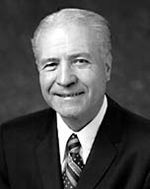Difference between revisions of "G. Homer Durham"
| Line 21: | Line 21: | ||
{{DEFAULTSORT:Durham, G. Homer}} | {{DEFAULTSORT:Durham, G. Homer}} | ||
| − | [[Category:Church Leaders: Past]][[Category:Presidents of the | + | [[Category:Church Leaders: Past]][[Category:Presidents of the Seventy]][[Category:Regional representatives]][[Category:Famous Mormons]][[Category:Church Historian]] |
Revision as of 15:20, 23 March 2022
G. Homer Durham was an educator, historian, and author. He was also an emeritus General Authority of The Church of Jesus Christ of Latter-day Saints.
He was born on February 4, 1911, in Parowan, Utah. At the age of two, he moved to Boston with his parents, where his father studied music; his father was a vocalist and composer. The family later moved to Salt Lake City, where Durham was reared. Although Durham was also a musician, he pursued degrees that would take him into the world of academics. He earned his bachelor’s degree in political science and history from the University of Utah and his PhD in political science from the University of California, Los Angeles.
He became the first head of the University of Utah’s Political Science Department. He later served as the academic vice president of the University of Utah. From 1960 to 1969, he was the president of Arizona State University. From 1969 to 1976, he served as the first commissioner and executive officer of the Utah System of Higher Education.
He frequently contributed articles to the Improvement Era and wrote several books, including Joseph Smith, Prophet-Statesman; A Political Interpretation of Mormon History; Man as a Political Animal; Arizona State University, 1960–1969: A Personal History; and compilations of the teachings of Church leaders such as N. Eldon Tanner (N. Eldon Tanner, His Life and Service), Heber J. Grant (Gospel Standards: Selections from the Sermons and Writings of Heber J. Grant), David O. McKay (Gospel Ideals: Selections from the Discourses of David O. McKay), John Taylor The Gospel Kingdom: Selections from the Writings and Discourses of John Taylor, Third President of The Church of Jesus Christ of Latter-day Saints), John A. Widtsoe (Evidences and Reconciliations), and Wilford Woodruff (The Discourses of Wilford Woodruff, Fourth President of The Church of Jesus Christ of Latter-day Saints).
Durham served as a missionary in the British Mission. He met his future wife, Leah, on his mission; she was a daughter of his first mission president, John A. Widtsoe. Also while serving his mission, he was called as the mission’s Young Men’s Mutual Improvement Association president. He later served as a stake president, a member of the Sunday School general board, and a regional representative of the Twelve. He was sustained as a member of the First Quorum of the Seventy on April 2, 1977, where he served for the rest of his life. He was sustained to the Presidency of the Seventy on October 1, 1981 and served until his death on January 10, 1985. From 1982 until his death, he also served as Church Historian and Recorder.
He composed the music of the Church hymn “My Redeemer Lives,” which was written by Gordon B. Hinckley, who was a lifelong friend of Durham’s. The hymn is included in the 1985 English Hymns of The Church of Jesus Christ of Latter-day Saints.
General Conference Talks of G. Homer Durham
